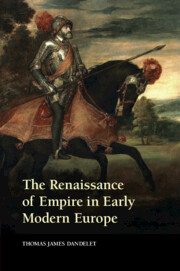Crossref Citations
This Book has been
cited by the following publications. This list is generated based on data provided by Crossref.
2014.
Imperial Ambition in the Early Modern Mediterranean.
p.
23.
2014.
Imperial Ambition in the Early Modern Mediterranean.
p.
160.
Reinert, Sophus A.
2015.
A Companion to Intellectual History.
p.
402.
2015.
Reason of State.
p.
61.
Sutherland, Suzanne
2016.
From Battlefield to Court: Raimondo Montecuccoli’s Diplomatic Mission to Queen Christina of Sweden after the Thirty Years’ War.
The Sixteenth Century Journal,
Vol. 47,
Issue. 4,
p.
915.
2017.
Apocalypse and Anti-Catholicism in Seventeenth-Century English Drama.
p.
1.
2017.
Apocalypse and Anti-Catholicism in Seventeenth-Century English Drama.
p.
24.
Stone, Robert S.
2017.
Autos-da-fé: The Roles of a Saint in Spanish Sicily.
I Tatti Studies in the Italian Renaissance,
Vol. 20,
Issue. 1,
p.
205.
Mallia‐Milanes, Victor
2017.
Mediterranean Identities - Environment, Society, Culture.
2017.
Apocalypse and Anti-Catholicism in Seventeenth-Century English Drama.
p.
199.
Tubau, Xavier
2017.
Hispanic Conciliarism and the Imperial Politics of Reform on the Eve of the Council of Trent.
Renaissance Quarterly,
Vol. 70,
Issue. 3,
p.
897.
Lynn, Kimberly
and
Rowe, Erin Kathleen
2017.
The Early Modern Hispanic World.
p.
1.
Terry-Roisin, Elizabeth Ashcroft
2018.
Encyclopedia of Renaissance Philosophy.
p.
1.
Terry-Roisin, Elizabeth Ashcroft
2018.
Encyclopedia of Renaissance Philosophy.
p.
1.
Terry-Roisin, Elizabeth Ashcroft
2018.
Encyclopedia of Renaissance Philosophy.
p.
1.
Nexon, Daniel H.
and
Neumann, Iver B.
2018.
Hegemonic-order theory: A field-theoretic account.
European Journal of International Relations,
Vol. 24,
Issue. 3,
p.
662.
Terry-Roisin, Elizabeth Ashcroft
2019.
Encyclopedia of Renaissance Philosophy.
p.
1.
2020.
Church and State in Spanish Italy.
p.
31.
2020.
Church and State in Spanish Italy.
p.
185.
2020.
Church and State in Spanish Italy.
p.
261.





